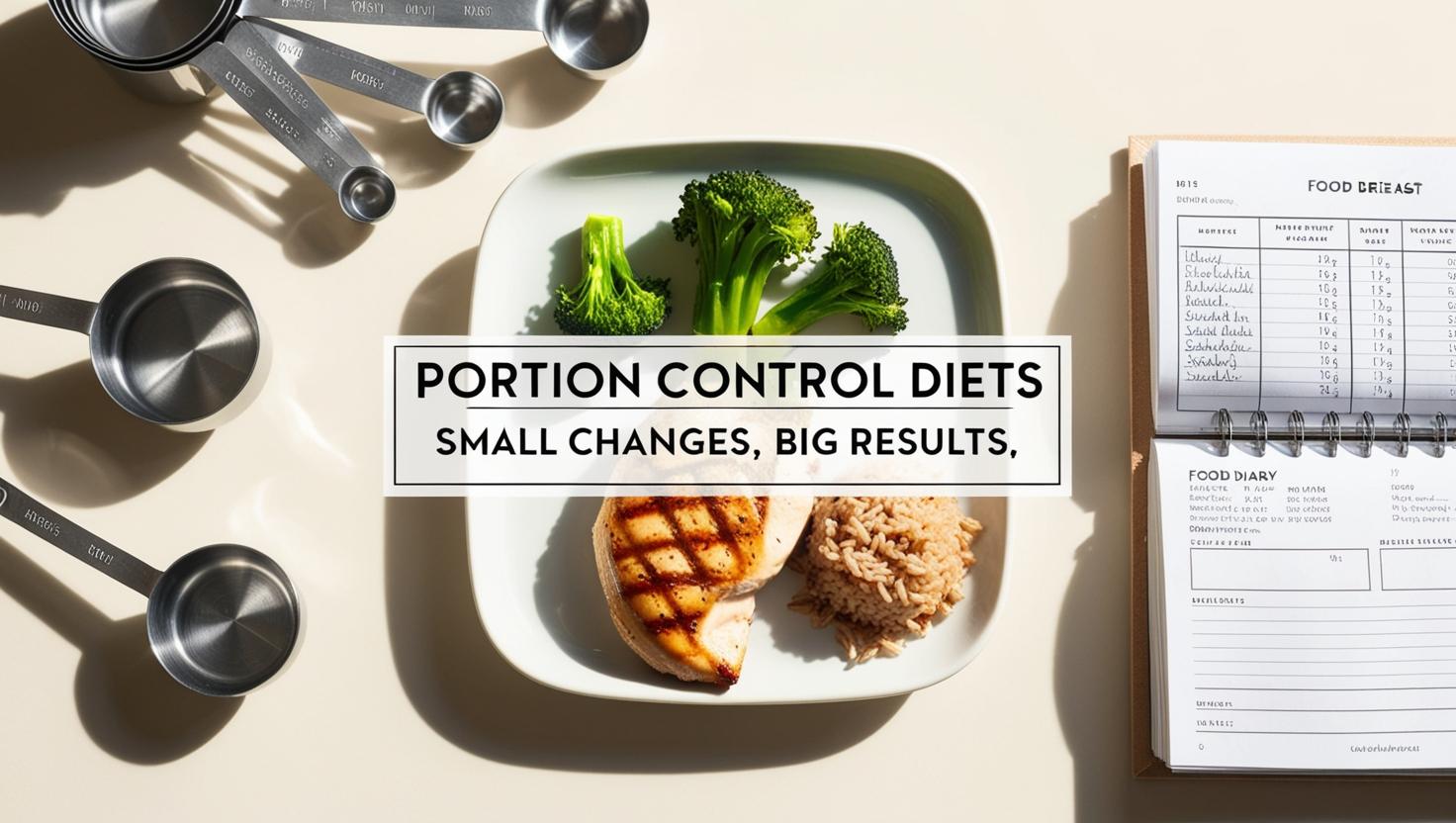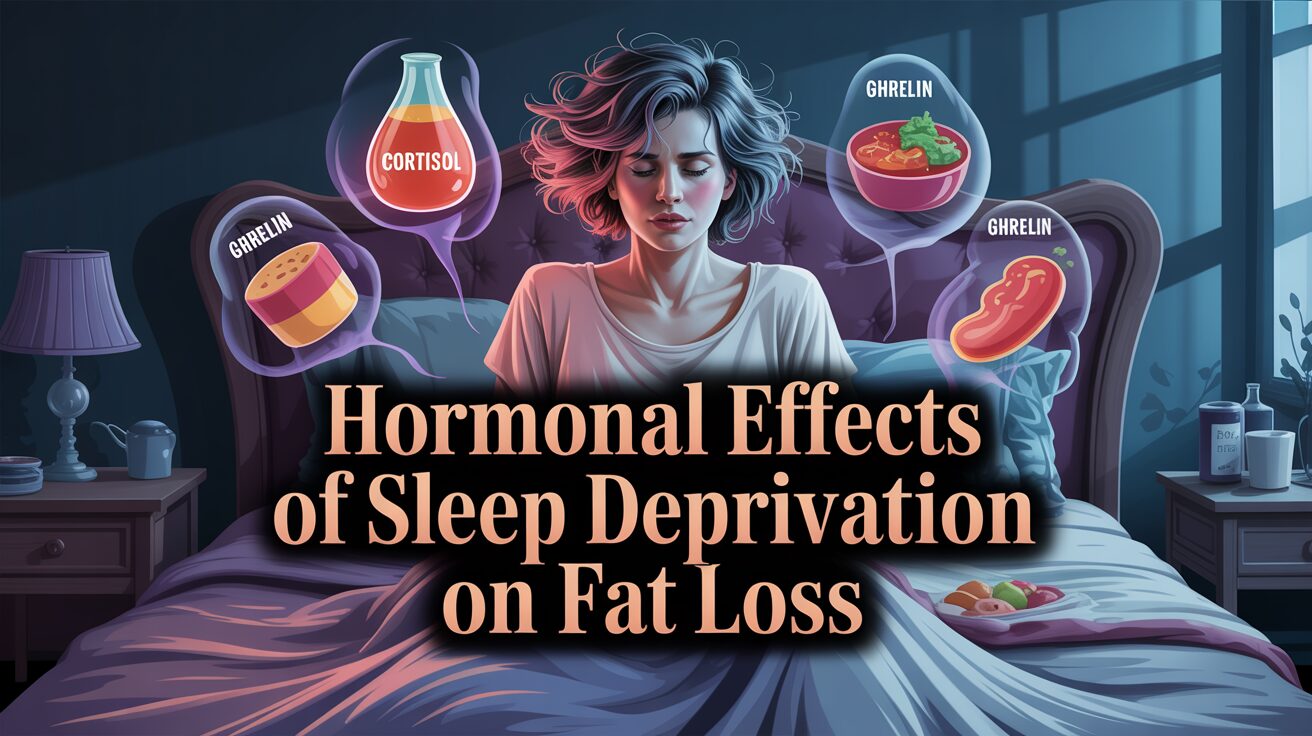
Hormonal Effects of Sleep Deprivation on Fat Loss
Ever hit that 2 AM wall and suddenly need a donut? Blame your hormones. When you skimp on rest, your body flips into survival mode, hoarding fat like a squirrel with winter anxiety.
Missing just two hours of sleep for four nights can spike cortisol (your stress hormone) by 37%. This turns your metabolism into a confused raccoon—snatching carbs instead of burning them.
Here’s the kicker: tired brains crave junk food 30% more. Why? Sleep-deprived bodies pump out ghrelin (the “feed me” hormone) while slashing leptin (the “I’m full” signal). It’s a hormonal mutiny.
By the end of this guide, you’ll either:
1) Start treating bedtime like a VIP meeting, or
2) Feel oddly guilty about that third episode of your late-night binge.
What Is Sleep Deprivation and How Common Is It?
Chronic exhaustion isn’t a badge of honor—it’s a metabolic disaster. Whether you’re burning the midnight oil or surviving on toddler-style naps, your body keeps score. Let’s break down the two flavors of tired: acute (one wild night) and chronic (months of baby-induced chaos). One’s a bad day; the other’s a lifestyle.
Defining Sleep Deprivation: Acute vs. Chronic
Acute deprivation is like forgetting to charge your phone—annoying but fixable. Chronic? That’s a phone permanently stuck at 1%. Here’s the difference:
| Type | Duration | Hormonal Fallout |
|---|---|---|
| Acute | 1–2 nights | Temporary cortisol spike, junk food cravings |
| Chronic | Weeks+ | Leptin crashes, insulin resistance, fat storage mode |
Sleep Needs by Age Group
Teens aren’t lazy—their brains demand 8–10 hours. Blame biology, not TikTok. Here’s what enough sleep looks like across ages:
- Newborns: 14–17 hours (basically tiny CEOs of napping)
- Adults: 7–9 hours (yet 1 in 3 get fewer than 7)
- Seniors: 7–8 hours (with more daytime catnaps)
U.S. Statistics on Sleep Deprivation
More Americans are running on empty than the population of California and Texas combined—50–70 million adults. Modern life sabotages rest: we’re wired to binge shows but not handle the hormonal hangover. Even crappy sleep counts—it’s like charging your phone on a faulty cable.
The Science of Sleep: Stages and Hormonal Regulation
Your brain at 3 AM isn’t just tired—it’s hosting a hormonal rave. Each night, your body cycles through sleep stages like a rock concert: light sleep opens the show, deep sleep handles repairs, and REM is the headliner where magic happens. Skip any act, and your metabolism pays the price.
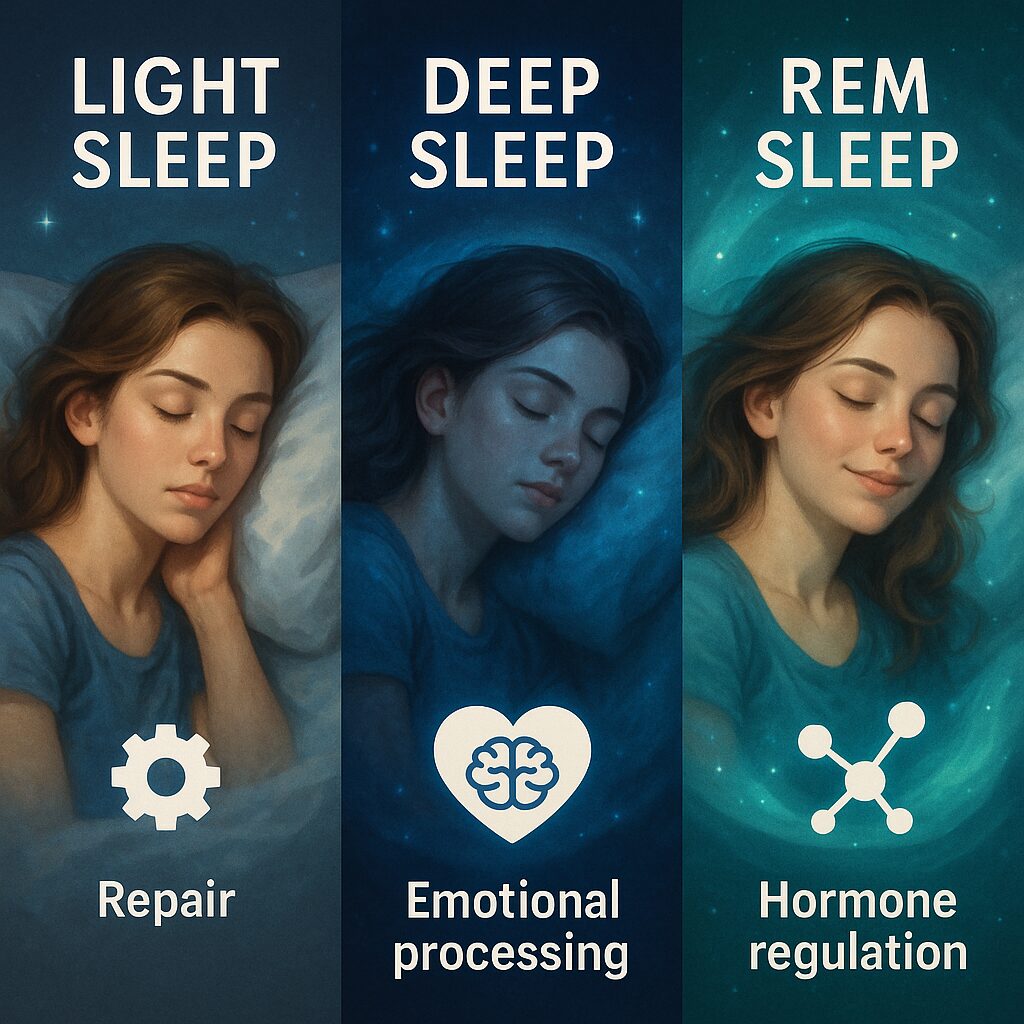
Key Sleep Cycles (REM vs. Non-REM)
Think of sleep cycles as car gears. Miss a shift, and your hormonal engine sputters. Here’s the breakdown:
| Stage | Role | What Happens If You Skip It |
|---|---|---|
| Light (Non-REM) | Warm-up | Grogginess, like a phone stuck in power-saving mode |
| Deep (Stage 3) | Body’s maintenance crew | 25% fewer repairs with age; hormones go haywire |
| REM | Emotional processing | 30% stronger junk food cravings (RIP diet) |
How Sleep Deprivation Hijacks Hormones
Pulling all-nighters throws a wrench in your cortisol clock. Here’s the fallout:
- Deep sleep loss: Your body stops producing growth hormone, the VIP of fat metabolism.
- REM deprivation: Emotional control tanks. No REM? Hello, 3 AM online shopping and nacho binges.
- Circadian chaos: Night owls suffer most—their time-shifted cortisol spikes confuse hunger signals.
Bottom line: Skimp on rest, and your hormones revolt like toddlers denied candy.
Sleep Deprivation and Its Direct Impact on Fat-Loss Hormones
Your hormones throw a tantrum when you skip rest—here’s the messy aftermath. Cutting corners on shut-eye doesn’t just leave you groggy; it turns your metabolism into a hormonal warzone. Let’s break down the three biggest saboteurs.

Cortisol: The Stress Hormone and Fat Storage
Imagine cortisol as a panic-stricken intern during a crisis. When you’re exhausted, it hoards belly fat like toilet paper in 2020. Research shows cortisol spikes by 37% after just four nights of shortened rest, pushing your body to store fuel instead of burning it.
Ghrelin and Leptin: Hunger Hormones Gone Haywire
Skip rest, and your stomach becomes a black hole for carbs. Ghrelin (the “feed me” hormone) surges by 15%, while leptin (the “I’m full” signal) drops by the same amount. This imbalance explains why you crave pizza at 2 AM like it’s your life’s purpose.
| Hormone | Role | Sleep-Deprived Effect |
|---|---|---|
| Ghrelin | Signals hunger | Spikes 15–28%, demands junk food |
| Leptin | Signals fullness | Drops 15–19%, ignores satiety |
Insulin Resistance and Blood Sugar Dysregulation
Sleep-deprived cells lock their doors against glucose like moody teenagers. Just four days of poor rest slashes insulin sensitivity by 30%, making your body process sugar like a pre-diabetic. That’s why you feel “hangry” after a bad night—your hormones declare war on your diet.
For a deeper dive into sleep deprivation’s metabolic fallout, science confirms the risks are real. The fix? Treat bedtime like your metabolism depends on it—because it does.
Metabolic Consequences of Poor Sleep
Missing rest turns your body into a calorie-hoarding machine—science explains how. When you’re exhausted, your metabolism slams the brakes while cravings hit the gas. Adults burning the candle at both ends face a brutal combo: eating more and burning less, like paying bills with a slashed salary.
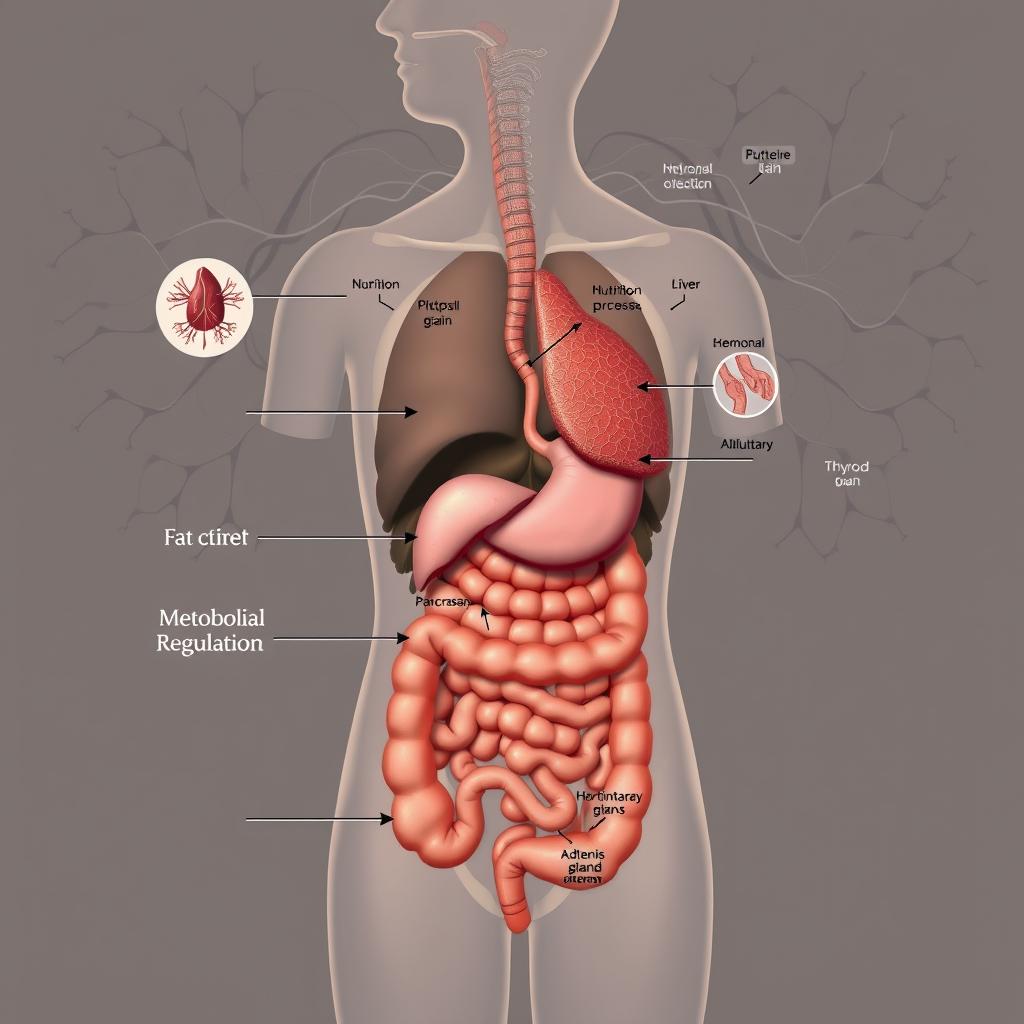
Slowed Metabolism and Weight Gain
Chronic exhaustion slows your calorie burn by 5–20%. Imagine your metabolism as a sloth—barely moving—while cravings rev like a race car. Research shows tired bodies:
- Burn fewer calories at rest (even during Netflix marathons)
- Opt for carbs over fat as fuel, like a car running on low-grade gas
- Consume 385 extra calories daily—enough to pack on 1lb every 9 days
The Link Between Poor Rest and Obesity
Skimping on shut-eye isn’t just about yawns; it’s a direct threat to your waistline. Studies reveal:
- 50% higher obesity risk for those sleeping under 6 hours (worse than skipping workouts)
- Glucose processing drops by 40%, turning cookies into belly fat faster
- Insulin sensitivity crashes, increasing diabetes risk
Your scale isn’t broken—your sleep schedule is. Every lost hour racks up metabolic debt your body can’t repay.
Sleep Deprivation’s Ripple Effect on Overall Health
Your body keeps receipts for every skipped hour of rest—and the bill comes due in unexpected ways. Beyond weight struggles, chronic exhaustion taxes your heart, weakens defenses, and fuels emotional eating. Let’s unpack the collateral damage.
Cardiovascular Risks: Your Heart on Empty
Think of a sleep-starved heart like an engine running without oil changes. Gunk builds up. Studies show 45% higher heart disease risk for those chronically short on rest. Here’s why:
- Blood pressure spikes (hypertension rates double)
- Inflammation markers rise like a bad stock market
- Arteries age 10 years faster than well-rested peers
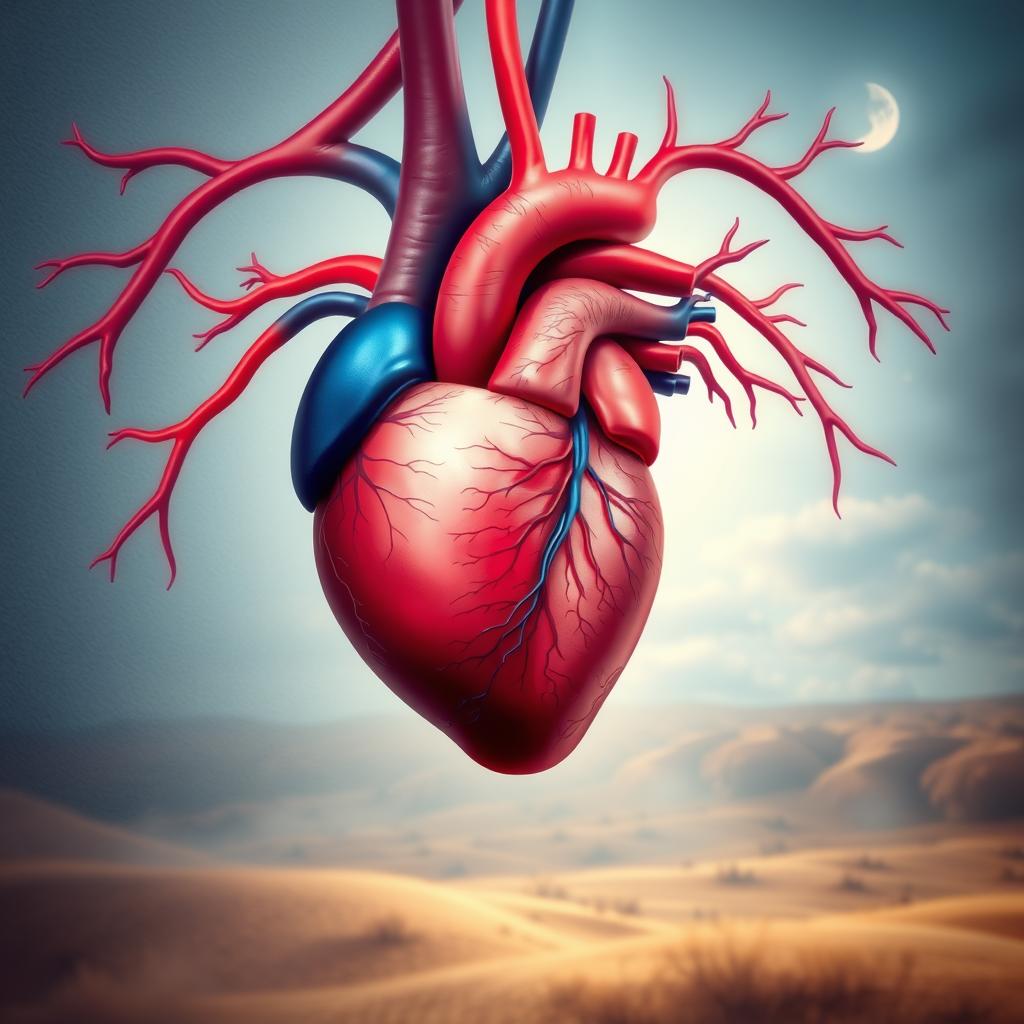
Immune System Vulnerabilities
Missing rest? Your T-cells tap out like exhausted babysitters. Research reveals:
| Impact | Data |
|---|---|
| Flu antibody production | Drops by 50% after 4 nights of 4-hour sleep |
| Infection recovery | 2x slower with poor rest |
| Vaccine effectiveness | Cut by half if sleep-deprived pre-shot |
Mental Health and Emotional Eating
Tired brains choose cookies over kale—it’s biology, not weakness. Sleep loss hikes depression risk by 30% and triggers a vicious cycle:
- Fatigue → stress eating
- Guilt → worse sleep
- Repeat until sweatpants become work attire
The fix? Treat rest like your heart and sanity depend on it—because they do. Even small improvements curb these risks dramatically.
Sleep Disorders That Worsen Hormonal Imbalance
Snoring isn’t just annoying—it’s a hormonal time bomb. Some nighttime issues don’t just steal rest; they reprogram your body to store fat like a doomsday prepper. Here’s how sleep disorders turn your metabolism against you.

Sleep Apnea and Its Role in Fat Retention
Meet the snoring disorder that turns you into a hormonal dumpster fire. Sleep apnea—where breathing pauses like a buffering video—affects 80% of undiagnosed adults. Each gasp for air signals your body to stockpile fuel, leading to 60% higher visceral fat in sufferers.
Why? Oxygen drops trigger cortisol spikes, while disrupted rest slashes leptin. The result: midnight fridge raids and a waistline that won’t quit. Pro tip: If your partner’s snoring mimics a chainsaw, get tested. Your hormones (and relationship) will thank you.
Insomnia vs. Sleep Deprivation: Key Differences
One’s can’t sleep; the other’s won’t sleep—but both wreck your waistline. Here’s the breakdown:
- Insomnia: Takes 3x longer to fall asleep, hikes cortisol, and fuels emotional eating (hello, 3 AM cereal).
- Deprivation: Voluntary rest-cutting that confuses hunger hormones. Less leptin + more ghrelin = carb cravings on steroids.
Both create a vicious cycle: bad sleep → worse hormones → worse sleep. Break it by treating bedtime like a metabolic reset button—not a negotiable.
How to Combat Sleep Deprivation for Better Fat Loss
Your bed might be the most underrated fat-loss tool in your house. While gym memberships and diet plans steal the spotlight, optimizing your rest could be the missing link in your weight management puzzle. Let’s turn your bedroom into a hormone-balancing powerhouse.

Optimizing Your Sleep Environment
Your mattress matters more than your Netflix subscription. A cool, dark room isn’t just cozy—it’s science-backed. Studies show 65°F temperatures improve rest quality by 40%, while blackout curtains can boost deep sleep stages. Pro tips:
- Light control: Evening screen exposure delays melatonin by 90 minutes. Try amber glasses post-sunset.
- Noise management: White noise machines mask urban sounds better than earplugs.
- Bedding upgrades: Bamboo sheets regulate temperature better than cotton.
Diet and Lifestyle Adjustments
Salmon for dinner isn’t just tasty—it’s nature’s melatonin helper. Omega-3s in fatty fish support hormone production, while tart cherry juice boosts natural sleep aids. Other game-changers:
| Timing | Action | Impact |
|---|---|---|
| Afternoon | 20-min walk | Resets circadian rhythm |
| 7 PM | Protein-rich dinner | Stabilizes blood sugar overnight |
| 9 PM | Magnesium supplement | Eases muscle tension |
When to Seek Professional Help
If counting sheep feels like herding cats, it’s time for expert input. Sleep studies aren’t spas, but they reveal why you’re always tired. CPAP users lose 3x more belly fat than untreated apnea patients—one case showed 15 lbs gone in two months without dieting.
Warning signs needing medical attention:
- Gasping awake with a racing heart
- Daytime exhaustion despite 8+ hours in bed
- Chronic short rest periods linked to metabolic risks
Skip quick fixes like sleeping pills—they’re duct tape solutions. Real change comes from addressing root causes, not masking symptoms.
Prioritizing Sleep for Long-Term Metabolic Health
Think of quality rest as your metabolism’s secret weapon—ignore it at your waistline’s peril. Like a 401(k), investing in shut-eye now prevents metabolic bankruptcy later. Remember: cortisol adores donuts, and your bed is the gym your hormones actually want to use.
For busy adults, time in bed beats time on the treadmill for fat loss. Fix your rest, and your hormones might finally stop sabotaging your jeans. Need proof? Metabolic health improves dramatically with consistent sleep—no kale required.
Next time you debate “one more episode,” ask: Is this worth an extra inch? Your pillow is waiting. Your fat cells? Not so much.
References
1. Spiegel K, et al. ‘Impact of sleep debt on metabolic and endocrine function.’ Lancet, 1999.
2. Greer SM, et al. ‘The impact of sleep deprivation on food desire in the human brain.’ Nat Commun, 2013.
3. Taheri S, et al. ‘Short sleep duration is associated with reduced leptin, elevated ghrelin, and increased body mass index.’ PLoS Med, 2004.
4. CDC. ‘Sleep and sleep disorders.’ Centers for Disease Control and Prevention, 2017.
5. Van Cauter E, et al. ‘Sleep loss and hormonal regulation of metabolism.’ J Clin Endocrinol Metab, 2005.
6. Leproult R, Van Cauter E. ‘Effect of 1 week of sleep restriction on testosterone levels in young healthy men.’ JAMA, 2011.
7. Buxton OM, et al. ‘Sleep restriction for 1 week reduces insulin sensitivity in healthy men.’ Diabetes, 2010.
8. Nedeltcheva AV, et al. ‘Insufficient sleep undermines dietary efforts to reduce adiposity.’ Ann Intern Med, 2010.
9. Cappuccio FP, et al. ‘Meta-analysis of short sleep duration and obesity in adults.’ Sleep, 2008.
10. Donga E, et al. ‘Partial sleep restriction decreases insulin sensitivity in type 2 diabetes.’ Diabetes Care, 2010.
11. Ayas NT, et al. ‘Sleep duration and coronary heart disease risk: the Nurses’ Health Study.’ Arch Intern Med, 2003.
12. Prather AA, et al. ‘Behaviorally assessed sleep and susceptibility to the common cold.’ Sleep, 2015.
13. Baglioni C, et al. ‘Insomnia as a predictor of depression: a meta-analytic evaluation.’ J Affect Disord, 2011.
14. Punjabi NM, et al. ‘Sleep-disordered breathing and insulin resistance in the general population.’ Am J Respir Crit Care Med, 2004.
15. Okamoto-Mizuno K, et al. ‘Effects of thermal environment on sleep and circadian rhythm.’ J Physiol Anthropol, 2005.
16. Harsch IA, et al. ‘CPAP treatment improves insulin sensitivity in sleep apnea.’ Am J Respir Crit Care Med, 2004.
